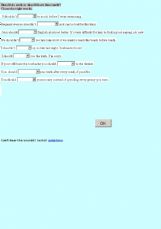
|
should
A short exercise showing the difference between using should and should have.
Level: intermediate
Age: 12-100
Author:Elena
Fullscreen
|

|
Have to/ Had to
the function of Have to/ had to for elementary and pre-intermediate level students
Level: elementary
Age: 12-100
Author:Ayfer Yıldız
Fullscreen
|

|
must/can�t/might and the present/perfect infinitive
Exercise on modals for logical assumptions and the present / perfect infinitive. For advanced students.
Level: advanced
Age: 14-100
Author:Olga Vareli
Fullscreen
|
|
|

|
Modal verbs
it is a consolidation page after the teacher tought the modal CAN
Level: elementary
Age: 8-14
Author:Claudia Badarau
Fullscreen
|

|
You could ask for help
This exercise is meant to practice asking for and receiving advice. There�s a chart illustrating the use of the target language to guide students. For that matter students will learn the use of the modals:(SHOULD/COULD/WOULD) and the use of phrases to make suggestions:(Why don�t you try...? Have you thought about...?)
Level: Choose
Age: 12-100
Author:Monique Tapaj�s
Fullscreen
|
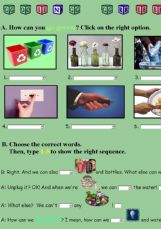
|
Going Green
It practices the use of CAN & CAN�T for possibility in the context of saving the planet. It also includes imperative and reference words (it, them).
Level: elementary
Age: 10-100
Author:jacque38
Fullscreen
|
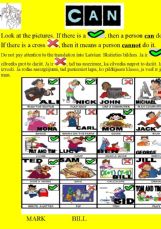
|
CAN or CANNOT?
a simple exercises to drill Can and Cannot. A matching ws is available on today�s contributions.
Level: elementary
Age: 3-100
Author:Jelena
Fullscreen
|
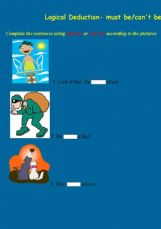
|
Logical deduction- must be/ can�t be
It�s a short fill in exercise in which students should fill in the correct answer according to the given illustrations.
Level: elementary
Age: 11-14
Author:tanjapan
Fullscreen
|

|
Modal Verbs and Expressions
Good practice for the modals and expressions with similar meanings.
Level: intermediate
Age: 14-100
Author:Eneya
Fullscreen
|
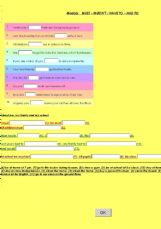
|
Modals
A basic exercise with must, mustn�t, have/has to and had to for an introduction of these modals.
Level: elementary
Age: 10-11
Author:Ingrid Heinisser
Fullscreen
|